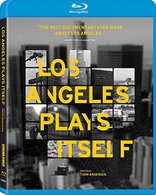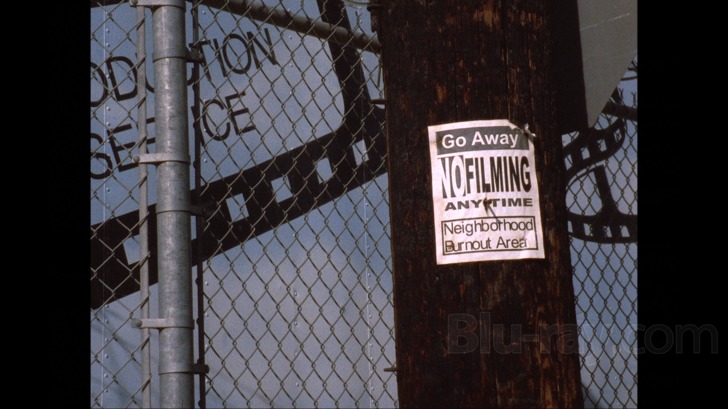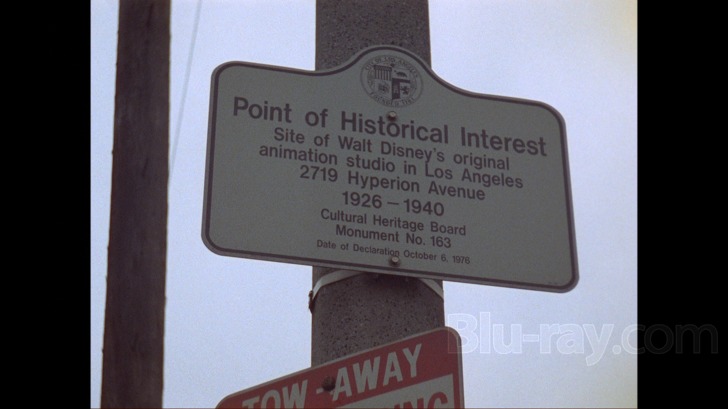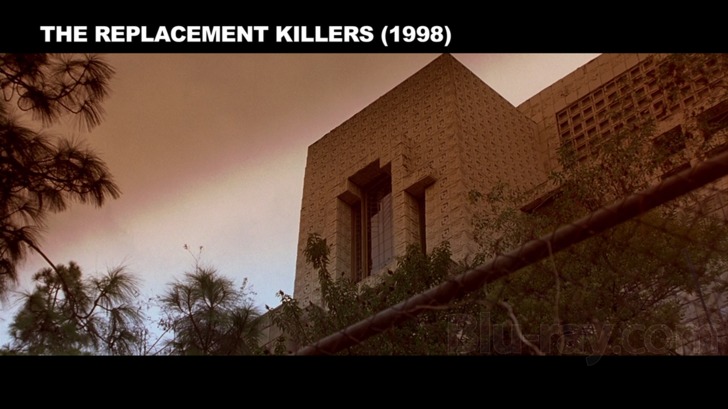Los Angeles Plays Itself Blu-ray Movie
HomeLos Angeles Plays Itself Blu-ray Movie 
Cinema Guild | 2003 | 170 min | Not rated | Oct 21, 2014
Movie rating
7.4 | / 10 |
Blu-ray rating
| Users | 0.0 | |
| Reviewer | 4.0 | |
| Overall | 4.0 |
Overview
Los Angeles Plays Itself (2003)
Of the cities in the world, few are depicted in and mythologized more in film and television than the city of Los Angeles. Examines in detail of the ways the city has been depicted, both when it is meant to be anonymous and when itself is the focus. Along the way, illustration of concerns of how the real city and its people are misrepresented and distorted through the prism of popular film culture. Furthermore, it is also a chronicle of the real stories of the city's modern history behind the notorious accounts of the great conspiracies that ravaged the city, that reveal a more open and yet darker past than the casual viewer would suspect.
Narrator: Encke KingDirector: Thom Andersen
| Documentary | Uncertain |
| History | Uncertain |
Specifications
Video
Video codec: MPEG-4 AVC
Video resolution: 1080p
Aspect ratio: 1.34:1
Original aspect ratio: 1.85:1
Audio
English: DTS-HD Master Audio 2.0
Subtitles
None
Discs
50GB Blu-ray Disc
Single disc (1 BD)
Playback
Region free
Review
Rating summary
| Movie | 4.0 | |
| Video | 4.0 | |
| Audio | 4.0 | |
| Extras | 2.0 | |
| Overall | 4.0 |
Los Angeles Plays Itself Blu-ray Movie Review
Reviewed by Brian Orndorf November 5, 2014The story of “Los Angeles Plays Itself” and its decade-long road to distribution is nearly as entertaining as the movie. Director Thom Andersen pulled together an elaborate patchwork quilt of film clips to tell the story of a city through the prism of its cinematic representations. However, paying for the rights to bring the documentary to screens proved to be cost prohibitive, leaving the effort to languish in limbo, only receiving appreciation during its initial festival run and through internet file sharing, where the picture developed a cult appreciation. Now ten years later, “Los Angeles Plays Itself” is revived with a slight re-edit, new source materials to beef up the examples, and an opportunity to reach the wide audience it was always made for.

In the early 2000s, Andersen was lost in a particularly irritable place, unsure how his home city of Los Angeles was perceived to rest of the world. Fed only movies and television shows depicting fantasy encounters or dire violence and poverty, the average consumer could never appreciate the L.A. Andersen knew like the back of his hand. Setting out to correct such limited understanding of west coast realities, Andersen constructed “Los Angeles Plays Itself,” a documentary dedicated to the separation of the city from its mythical stature, employing Encke King to be the voice of change, narrating the effort with a dry sense of humor and a gumshoe monotone.
Since the picture was mostly completed by 2003, “Los Angeles Plays Itself” doesn’t update its arguments and examples, with the most recent event showcased in the feature being the filming of “Swordfish,” where the production hauled a city bus through downtown L.A. via helicopter, pinpointing the insanity of moviemaking that often goes on in town. However, such feats of extravagance aren’t up for judgment. Andersen is working to achieve an enormous overview of Los Angeles-centric storytelling, collecting examples by the handful as he constructs an exhaustive examination of the city on screen, itemizing all the productions that’ve poured money into making L.A. look like an urban monster or a smoggy haven.
Andersen has compiled a massive collection of clips, pulled from the history of filmmaking itself. It’s not just the hits either, but a run of obscurities that really worked with L.A. to conjure strange moods, ranging from early Hollywood productions to bottom-shelf endeavors from the 1990s. It’s impressively curated by Andersen, who find access to enough productions to secure most of his arguments, while some obvious examples are missing for one reason or another (surprisingly little is mentioned about Quentin Tarantino’s city-obsessed oeuvre). Perhaps the most utilized titles are “Blade Runner,” “L.A. Confidential,” and “Double Indemnity,” though clips from dozens of pictures are provided (including “The Glimmer Man,” “The Player,” “Annie Hall,” and “Point Blank”). At first, Andersen creates a then-and-now viewing experience, detailing how much Los Angeles has changed throughout the years, singling out the Laurel and Hardy picture “The Music Box” and its iconic staircase set-piece as a prime example of Hollywood history gone to rot. We also see the now-closed diner from “Miracle Mile” and a few abandoned sets (hotels and gas stations) along the way, reinforcing how every corner of the city has been covered by cameras, captured in time and never returned to.
Andersen doesn’t have patience for the city, displaying disgust with the L.A. abbreviation and Hollywood’s emphasis on wealth and luxury, often pairing beachfront property with characters stuck in blue-collar jobs. An extended sequence devoted to architecture is provided, taking a look at the Bradbury Building, Frank Lloyd Wright’s Ennis House, and Union Station, where design elements were recycled and contorted to fit the needs to certain productions, who rarely embraced the natural majesty of the buildings. Also on Andersen’s pet-peeve list are cheats in locations, singling out movies where characters exit one business, only to end up 15 miles away in the next shot. It’s humorous, but Andersen seems genuinely irritated by the practice, celebrating a few features that refused such shortcuts.
The second half of “Los Angeles Plays Itself” moves away from superficial snapshots of sloppiness or external beauty to dig into raw issues of class on film, spotlighting how the underprivileged and decrepit neighborhoods have been depicted throughout the years, with “The Exiles” and “Killer of Sheep” routinely held up as the gold standards of honesty and integrity. It’s an interesting downshift into film theory, with Andersen eager to showcase his knowledge of the subject, but “Los Angeles Plays Itself” soon devolves into a movie review show, with extended looks at “L.A. Confidential,” “Grand Canyon,” “Hanging Up” (easily the most pointless detour of the documentary), “Chinatown,” and “Dragnet” (the television program) carrying on for too long, inching away from the once robust flow of information. Divided into chapters (“The City as Background,” “The City as Character,” and “The City as Subject”) for more precise deconstruction, “Los Angeles Plays Itself” loses concentration in its final hour, indulging its creator (who makes fun of actors and certain productions) instead of staying on task with a myriad of examples pertaining to Hollywood’s reluctance to showcase the city with any sort of authenticity. There’s already so much here that to watch Andersen suddenly slow down and smell the flowers leads to great confusion.
Los Angeles Plays Itself Blu-ray Movie, Video Quality 

It's tricky to even begin to discuss the visual quality of "Los Angeles Plays Itself," as footage shot by Andersen makes up such a tiny percentage of the movie. The AVC encoded image (1.34:1 aspect ratio) presentation is completely acceptable for what it is: a hodgepodge of clips from all types of features. Thankfully, most are sourced from DVD and BD releases, making transitions easy to stomach, while reinforcing the toxic beauty of a few titles that specialize in extreme colors. VHS and online sources fare worse, but those clips are few and far between. Hues are accurate, refreshed for the film's BD debut, delivering crisp reds on signage, while greenery looks accurate. Anderson's footage does have major speckling issues, but little pronounced damage.
Los Angeles Plays Itself Blu-ray Movie, Audio Quality 

The 2.0 DTS-HD MA sound mix also juggles a host of sonic differences, though it remains pleasingly contained, without massive divides in quality between disparate clips. Narration by Encke King is pronounced, heavy and authoritative, without slipping into distortive extremes. Music is supportive without being remarkable, balanced comfortably with the rest of the mix.
Los Angeles Plays Itself Blu-ray Movie, Special Features and Extras 

- Booklet (26 pages) offers essays from Mike Davis and director Thom Andersen, and an explanation of the picture's long journey to a home video release from Andersen.
- "The Tony Longo Trilogy" (14:03, HD) is a short film by Andersen celebrating the B-movie achievements of beefy tough guy actor Longo, with clips provided from "The Takeover," "Living in Peril," and "Mulholland Dr." There is no explanation as to why such a visual overview was created in the first place.
- And a Theatrical Trailer (1:21, HD) is included.
Los Angeles Plays Itself Blu-ray Movie, Overall Score and Recommendation 

The very fact that a ten year old documentary is now available to all is cause for celebration, but thankfully "Los Angeles Plays Itself" is quality work, helping viewers understand how profoundly the city has factored into the history of film, even when stripped of authenticity. It's a cineaste's dream come true, even with a few obvious flaws in execution and areas of indulgence.
Similar titles
Similar titles you might also like

The Decline of Western Civilization
1981

The Story of Film: An Odyssey
2011

Dawson City: Frozen Time
2016

The Look of Silence
2014

Hitchcock/Truffaut
2015

The Times of Harvey Milk
1984

America as Seen by a Frenchman
L' Amérique insolite
1960

The War Room
1993

Triumph of the Will
Special Edition | Triumph des Willens
1935

Garlic Is as Good as Ten Mothers
1980

The Act of Killing
2012

The Salt of the Earth
Le Sel de la Terre
2014

Exit Through the Gift Shop
2010

The Maestro: King of the Cowboy Artists
1994

The Atomic Cafe
1982

The Great Buster: A Celebration
2018

Get a Life!
2012

Echoes from a Somber Empire
1990

Black Panthers
1968

Wheel of Time
2003